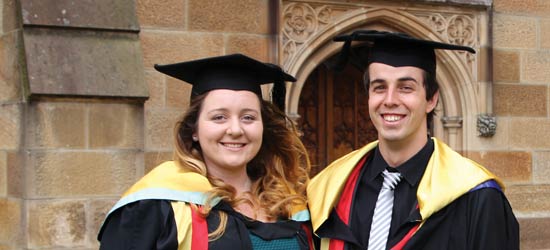
Bethany was one of seven Aboriginal and Torres Strait Islander students specialising in Allied Health who graduated. Three students graduated with a Masters of Physiotherapy and two with degrees in physio, and one in speech therapy and occupational therapy.
Bethany, originally from Liverpool in Sydney but with family ties to Northern NSW, says she loves the challenge of working in a rural community of around 8,000 people.
“There is a large Indigenous population here, and my senior physiotherapist and I have been discussing ways to involve the health service in Indigenous education and becoming more a part of the Indigenous community. I’m really excited about being on board with that,” Bethany says.
An interest in sports science led Bethany to study physio, after originally considering a career in law.
“I always played sport growing up and spent a bit of time at the physio myself. In my senior years at high school I began to get interested in science. The degree is totally unlike what I imagined, having only thought about it from the sports injury side of things, but physios are involved in a hospital setting and rehabilitate people after strokes and head injuries,” she says.
“I now also work with disabled kids and I really enjoy that. Neuro physio is definitely what I like best. You get to change people’s lives. It’s not just about getting back on the sports field; you get to go on a journey with them at the most difficult time in their lives.”
Bethany’s job is busy as she is the full-time physiotherapist who covers Forbes, Parkes and Condobolin in central NSW.
On any one day, she can see people suffering from back pain and chronic conditions in the outpatient injury category and, through outpatient neuro, those suffering with multiple sclerosis and Parkinson’s disease. Then there are the in-patients – for example, those suffering with pneumonia.
But Bethany’s embracing the busy schedule and sees it as an opportunity to learn more about her profession, from the ground up.
“Being the only full-time physio here gives me continuity and that falls to me as the new grad here,” she says.
“In many ways, I’m introducing my role and establishing my professional credentials because they haven’t had access to a full-time physio.”Bethany is also keen to involve her local community more in the health system.
“The Wiradjuri people are not heavily involved in the hospital system here and that is something I want to change. I want to reach out to the community and perhaps develop some programs with the Aboriginal Health Worker,” she says.
“I have a big heart for my people and I want to help change perspectives so that the health system is an inclusive environment. The system needs to adapt to our culture.”
Bethany acknowledges she is just starting out and has a long but rewarding learning journey ahead.
“Working in a rural setting, you have to learn first and then try and address the inequities.”
But it’s a learning journey that she encourages others to follow, despite the initial pressures of tertiary studies to gain qualifications.
“Yes the course load is heavy and you are getting a lot of information in a short time. Then there is the competitiveness of the degree – I got special entry but all the mainstream students worked hard for their UAI to get in, and you have to compete with them as you earn your degree. But the Aboriginal support unit, Yooroang Garang, was really great and we all supported each other,” Bethany says.
“I’d encourage anyone at school thinking of going into a health career to do it. Don’t sell yourself short and don’t discount going to uni even if you are not doing so well at school because there are programs out there to help you.”
Comments are closed.